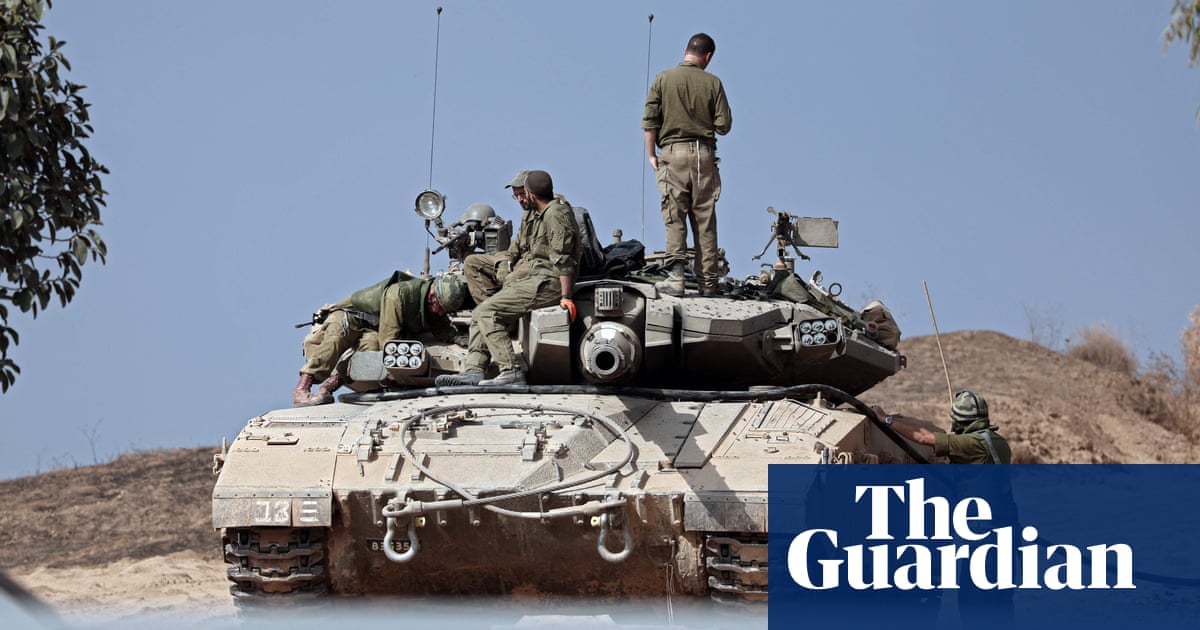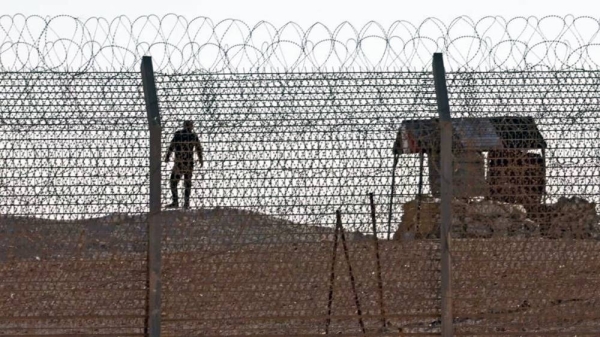
The double line of Israeli tanks stretched to the horizon. About 100 were visible, low-slung hulks quickly taking on the colour of the pervasive desert dust. This was just a small part of Israel’s coiled military might ranged along the borders of Gaza, waiting for the order to move. Israel has about 2,200 tanks, a massive force, 10 times the British army’s tank fleet, and many of them are here, fuelled up and pointing west.
About 20 miles (30km) to the north, near the border town of Sderot, huge self-propelled guns have been dug into the earth, angled towards Beit Hanoun and Gaza City, which lie just over the crest of a hill. Lorries and tankers carrying fuel and water run in convoys along the Israeli roads that run north to south, parallel to the Gaza border, and reservists fill the streets, cafes and petrol stations of the border towns that absorbed the brunt of the 7 October Hamas attack that ignited the current war.
More than 350,000 reservists have returned to service since that attack. Their cars fill the car parks at the major bases in southern Israel, and the overflow vehicles have been left haphazardly along the side of the road as the country’s youth rushed to answer the call.
Anat and Nurit (not their real names) were far away at the time of the attack: Anat was on a trip to Bali, which she had hoped would help her decide what to do with her life. Nurit was in Perth, Australia, visiting friends and relatives. They watched the news on television and quickly realised this was not business as usual, one of the periodic periods of hostilities they had experienced when they did their national service six years ago.
“At first, I thought I would just stay in Australia, but then it was clear there was no way I could,” Nurit said. Both women are in their mid-20s and had friends who had been at the Supernova music festival where 260 young people were gunned down. Some had survived. The body of another has only recently been found.
“It is real and immediate for us. These were people we knew,” Anat said. Her mother is from Bolton and became an Israeli after coming to work on a kibbutz and marrying a local. Anat returned from Bali last week in a plane sent specially to gather Israel’s young diaspora, which flew back full of reservists.
Anat and Nurit are now in military fatigues, eating lunch in the cafe at a petrol station, with assault rifles on their laps. They are part of a military intelligence unit, and underneath the uniforms they are still wearing the summer clothes they packed for their holidays.
“I still wake up and the shock is new again, that all this has happened. It feels like a terrible dream, and then I remember each morning that it’s real,” Nurit said.
They said their moods swung widely from despair to feeling that something positive will come out of this war, and back to despair again. At a neighbouring table, another young Israeli woman in military fatigues, about the same age, was weeping with her head in her hands, the tears dripping through her fingers.
The soldiers here have no idea when the order to attack will come.
“It is a rollercoaster,” Anat said. “Sometimes everything is tense and we are on alert, and then it relaxes again.”
To the north, in Tel Aviv, the Israeli military leadership is reported to be tussling with its civilian masters in Benjamin Netanyahu’s cabinet over when to unleash the army. Having massed their forces, the generals are straining at the leash to use them at their peak readiness. The government, however, is worried a ground invasion in Gaza will trigger an attack from Hezbollah over the northern border with Lebanon.
For now, the Israeli military is sharing the roads here with civilians. The farmers are out harvesting cotton and a yellow crop-duster plane could be seen making wide arcs over the fields within a few miles of the long column of tanks.
Rocket attacks on the area from Gaza are still a daily occurrence but they are diminishing each day. The Israeli military said it intercepted a Hamas drone headed for Ein HaBesor. The brunt of the war is being felt on the other side of the border, in Khan Younis, Rafah and Gaza City, which are under constant bombardment. Israeli special forces also carried out a raid, it was announced on Monday, to prepare the ground for the expected mass assault and to gather intelligence on more than 200 hostages taken by Hamas on 7 October.
Reminders of the 7 October attack are everywhere. The Supernova festival took place a few minutes drive from where Anat and Nurit were having lunch. On a junction just south of Sderot, the wreckage of a white Toyota had been left on the side of the road, its windows smashed and its side heavily perforated with bullet holes. Inside, the remains of extinguished lives were still visible: bits of clothing and a baby seat. The car belonged to a Bedouin family who had been ambushed by Hamas gunmen that morning.
They had managed to flee as far as a concrete bomb shelter nearby (there is one at every bus stop in this part of the country), but their attackers had followed them there and thrown a grenade inside, killing them all. The burst pattern has permanently defaced the gaily painted interior, a reminder that nothing in this part of Israel, and probably the whole Middle East, will ever be the same again.












